

☰ FIRTO Menu
🌍 FIRTO – Finding Rhythm Together
International course in rhythm-based facilitation and non-formal learning
Isegran, Fredrikstad – Week 40 (Norwegian autumn break)
Arrival: Sunday, September 28 – Departure: Saturday, October 4, 2025
Course days: Monday to Friday, September 29 – October 3
For youth workers and volunteers across Europe
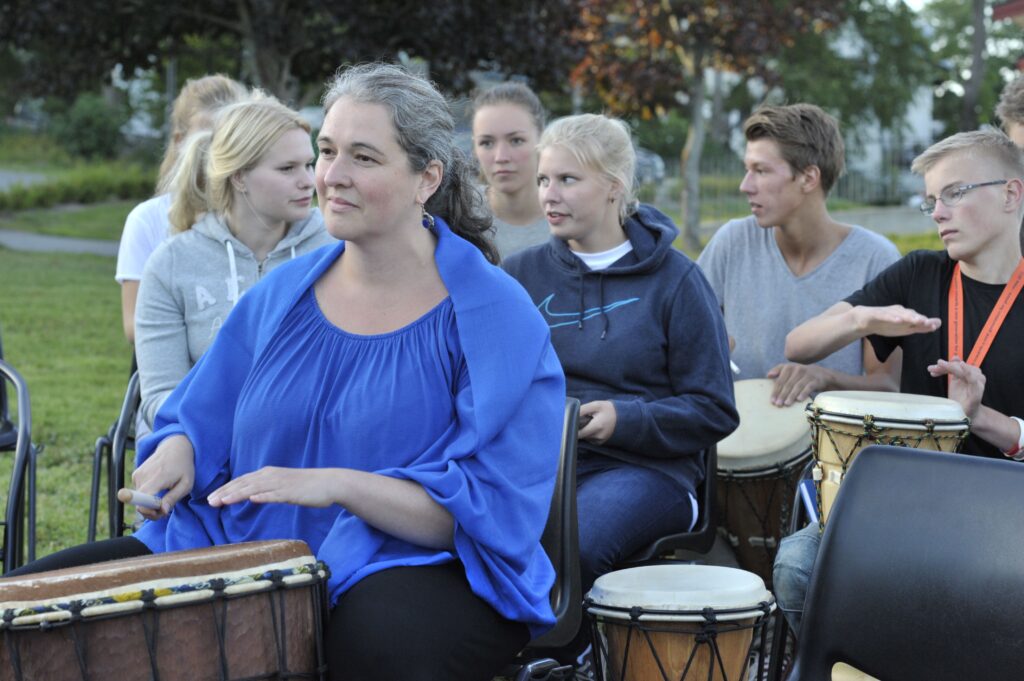
🎶 What this course is about
FIRTO is a unique international course that brings together young adults, volunteers and youth workers from across Europe to explore rhythm as a universal language for inclusion, expression and connection.
During five intense days on the island of Isegran in Fredrikstad, Norway, you will learn how to facilitate inclusive drum circles, build community through rhythm, and integrate non-formal learning methods into your youth work practice.
This is not a drumming workshop – it’s a training in human connection. Through movement, music, reflection and group dynamics, you’ll discover tools that help young people feel seen, heard and empowered.
“You don’t need to be a drummer. You just need to say yes.”
🧭 What you will learn
As a participant in FIRTO, you will return home with:
- Practical tools to lead rhythm-based events and drum circles with the young people you already work with
- A deeper understanding of youth work, empowerment and learning through rhythm, reflection and connection
Through hands-on experience, mentoring and group process, you will develop both skills and insight to support inclusion, participation and shared expression.
You will explore:
- The basics of Drum Circle Facilitation using the Village Music Circles™ method developed by Arthur Hull
- «Teaching Without Teaching«: building flow, presence and participation
- How to create safety, trust and group coherence without words
- Group musicality: how to support shared groove, listening and collective expression
- Core principles of non-formal learning: activity, reflection and application
- Body language and signal vocabulary for group leadership
- Adaptation for diverse groups (e.g. neurodivergence, cultural background, language barriers)
- Your own facilitation style, supported by mentoring and peer feedback
- The facilitator as a guide: leading from within, not from above
- Presence and responsiveness: how to listen with your whole body, in the drum-circles and in life
- Creating “Yes!” spaces: environments of trust and non-judgement
In other words LEAD
Learn to successfully facilitate rhythm- based events
Experience the power of community building through rhythm
Activate • Motivate • Empower! Rhythm for fun and learning
Discover camaraderie and spirit playing music together
🛠️ Methodology
The course is built on experiential learning. You’ll dive into a vibrant, life-filled training shaped through more than three decades of international cooperation. This method has not only been refined through this ongoing collaboration, it has also created a living, global network of rhythm-based facilitators. By joining FIRTO, you become part of a practice that is used in more than ten European countries and on every continent.
Resistance is futile as this whole person approach together with the power of group drumming lift us into a fully experienced learning of how diversity truly is an existential part of development, appreciation of life and growth. The rhythm sessions follow the structure of facilitated drum circles, not free-form jamming. The method is rooted in:
- Village Music Circles™– a structured, inclusive approach to rhythm-based facilitation
- Phenomenological pedagogy – learning through presence, sensing and full human engagement
- Non-formal education as practiced in Erasmus+ projects
- Group dynamics and mentoring – supporting personal development and peer learning
You will co-create, test and lead real drum circles in a safe, supportive learning community – and you will laugh, sweat, and probably surprise yourself.
“Drum circle facilitation is a never-ending journey in learning how to learn.”
— Arthur Hull
🧑🏽🤝🧑🏿 Who is this course for?
- Youth workers who want new tools for inclusion and participation
- Volunteers working in social, cultural or educational youth projects
No prior drumming or facilitation experience required – just curiosity and a willingness to participate.
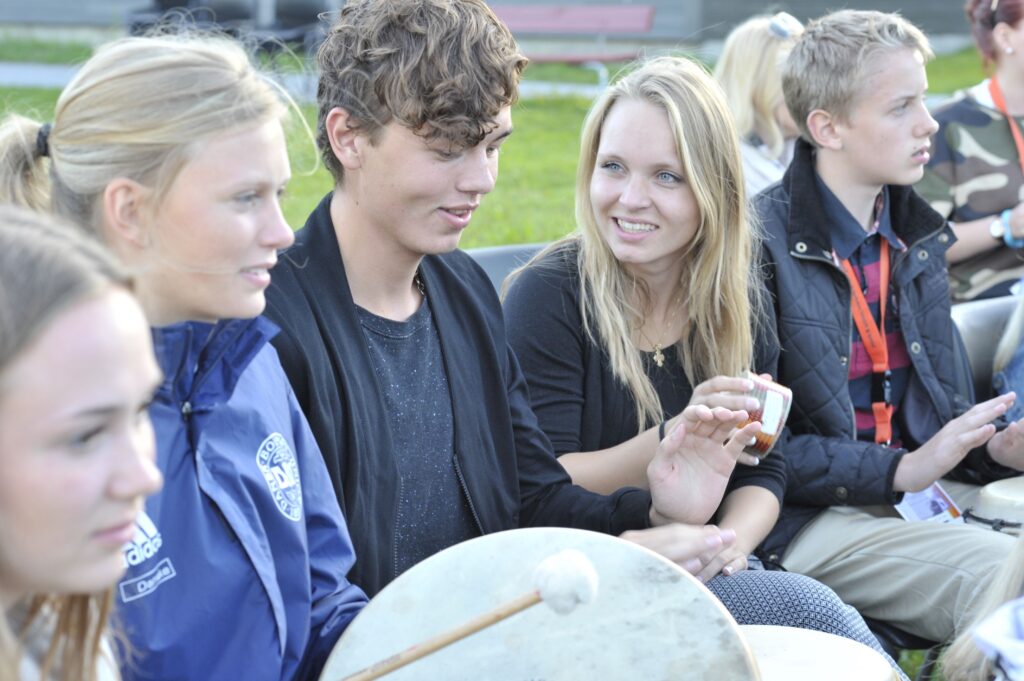
⏰ A Typical Day
Each day offers at least 8 hours of structured training, blending practical experience with playful, powerful rhythm-based learning. Most sessions take place in large or small groups, alternating between full-circle facilitation and breakout mentoring. Expect to move, drum, reflect and be surprised.
In addition to the core programme, participants are invited to share from their own practice through parallel sessions, allowing choice and relevance to different youth work contexts. Optional evening or morning sessions may include sound baths, movement sessions, yoga, Taketina rhythm work or small circles. All meals — breakfast, lunch and dinner — are shared on site.
Evenings end with an open drum circle: a space for freedom, connection and joy. Rhythm becomes a way to learn by day and a way to unwind by night.
🧑🏽🏫🧑🏼🏫🧑🏿🏫 Trainers
The course will be led by three experienced facilitators:
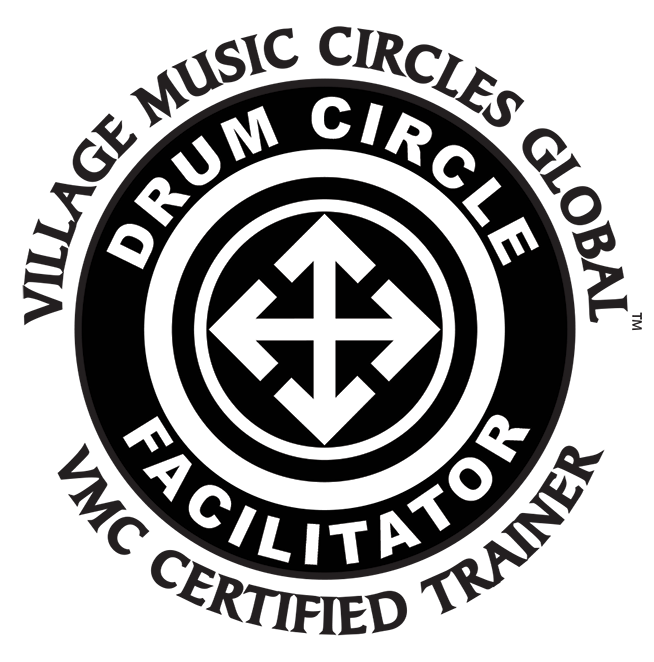
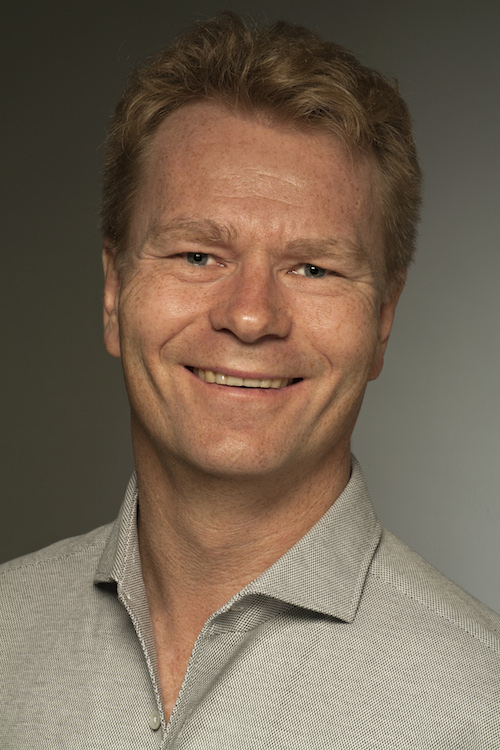
Mikael Khei (Klart Det, Norway) – lead trainer in rhythm facilitation. Mikael brings decades of experience in youth work, non-formal education, experience-based and adventure-based learning, and the power of rhythm to build connection, safety and shared presence. He has trained and collaborated with Arthur Hull and Village Music Circles for over 20 years and holds the highest level of certification as an internationally certified trainer. Mikael is also a certified Taketina rhythm facilitator, biodanza teacher, NLP Master Practitioner, and hypnotherapist. He holds university degrees in teaching, special education and child welfare – and is a passionate sailor and the founder of Klart Det.
Marina Luka (Puentes Hungary) – trainer in social inclusion, and intercultural learning. Has over 10 years of experience working with vulnerable social groups using performative and visual art and non-formal education methods indoors and outdoors. A graduate of the SALTO Training of Trainers, she integrates the EU Youth Worker Competence Model into her facilitation and mentoring practice that emphasizes experiential learning, group dynamics, and peer exchange. She holds university degrees in liberal arts and international relations. Founder of Puentes Hungary.
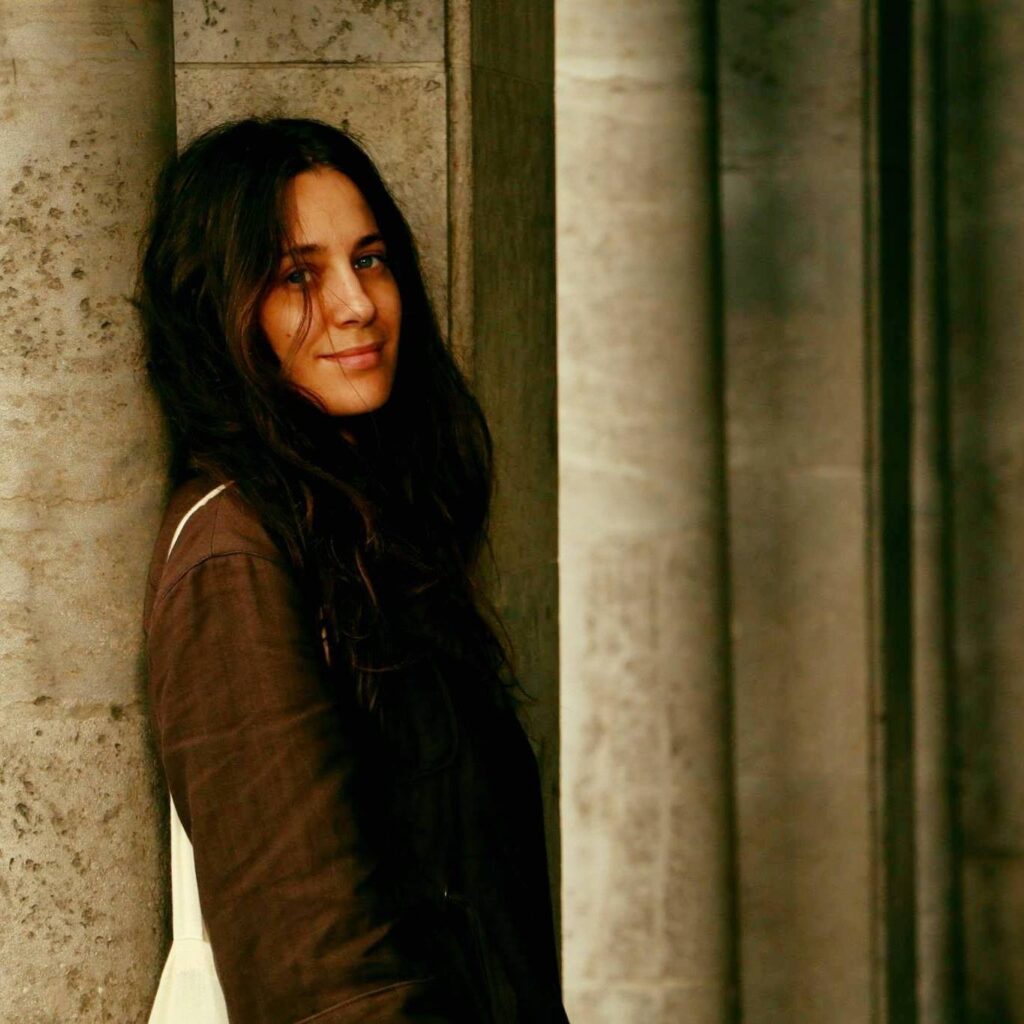
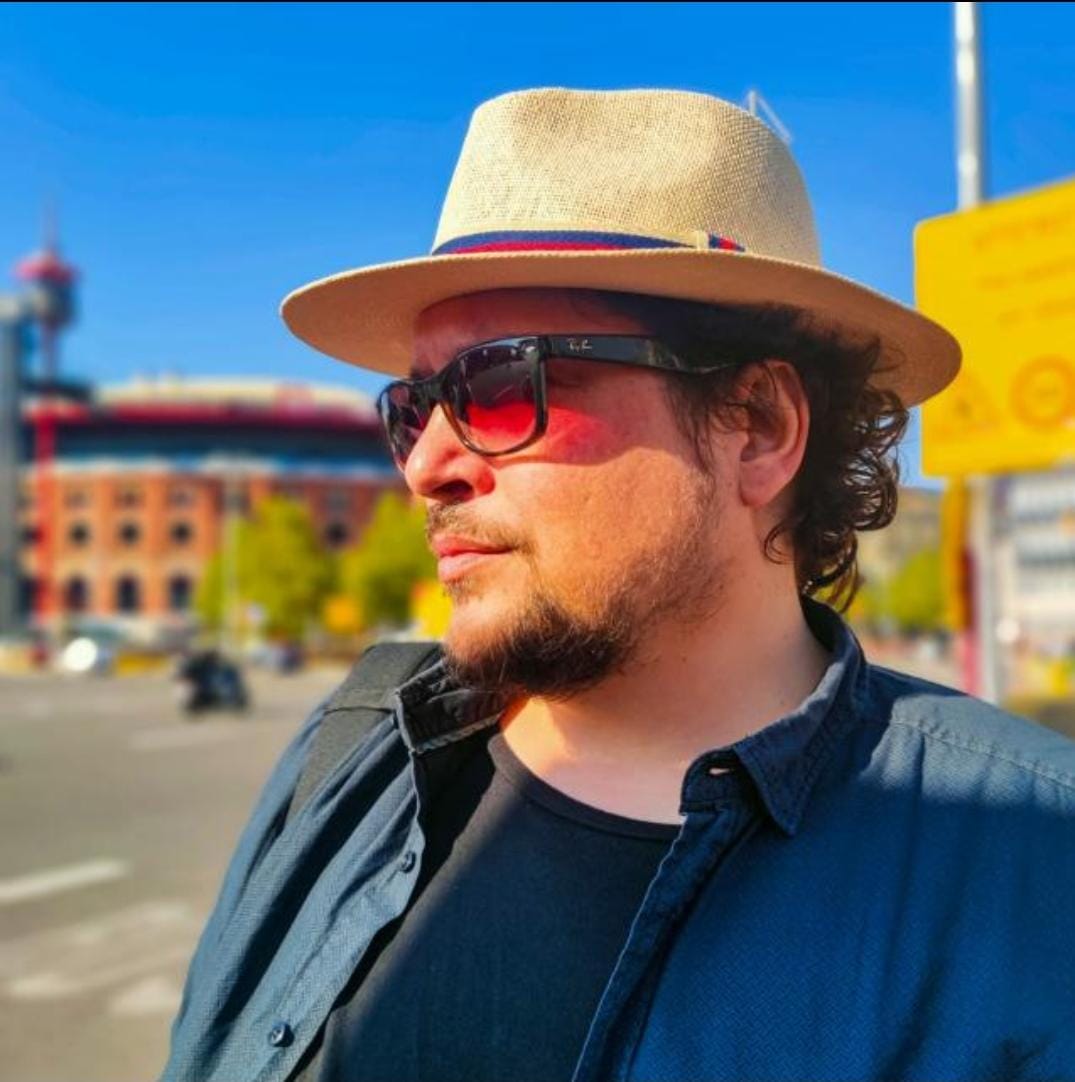
Tomás Mora (Sal Fuera, Spain) is a trainer who strongly focuses on non-formal education and inclusive learning. Over the past 15 years, Tomás has designed and facilitated 40+ international training courses across Europe, creating impactful learning experiences for young people and workers. He founded Youth HUB, a space for community-based learning and youth participation, and serves as Vice-President of Youth BCN.
Tomás teaches social entrepreneurship and intrapreneurship through the OSUN network at Bard College (NY), where he mentors international students in project-based courses. Known for creating safe, empowering learning spaces, FIRTO marks an exciting step in his ongoing journey to expand the use of rhythm as a language of inclusion and empowerment in non-formal education.
🪘Where Every Beat Belongs (VMC)
🌍 FIRTO is more than a training; it is an invitation into a global VMC drum circle community where rhythm is a universal language, and every beat finds its place.
Central to FIRTO’s five-day program is a full, three-day Village Music Circles (VMC) Drum Circle Facilitation training, taught to over 10,000 people worldwide.

🤝 In every circle, people experience friendship, intercultural dialogue, and the beauty of inclusion, all values that mirror Erasmus+. Participation is active. Every voice and beat is valued, fostering empowerment and building practical skills in listening, leadership, and creating safe, welcoming spaces.
This is experience-based, non-formal learning at its core: direct, physical, joyful, and alive. There is humor, vitality, and the spark of possibility in every session.
Many graduates return home eager to build their own spaces, bringing this experience of solidarity, trust, and shared pulse into their communities.
🌟 With VMC graduates in over 15 European countries and many more globally, this network is both European and universal. It is a living example of Erasmus+ ideals in action and a reminder that the same inclusive approach thrives across continents.
Participants in the FIRTO course also receive an official certificate as a VMC 3-Day Graduate, recognizing their completion of the full Village Music Circles Drum Circle Facilitation training and their place in this worldwide community.
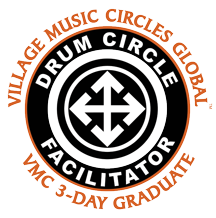
📚 You can find links to VMC videos under “Learning Resources” on this page.
📍 Practical information
🏠 The venue – Isegran & Minemagasinet
The program takes place in Fredrikstad, Norway, at two special venues:
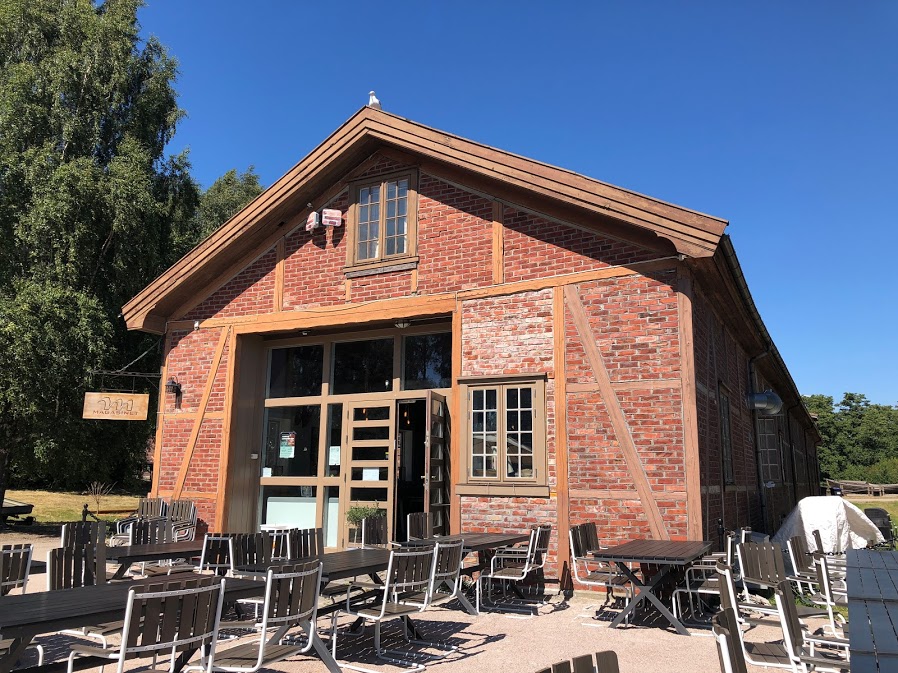
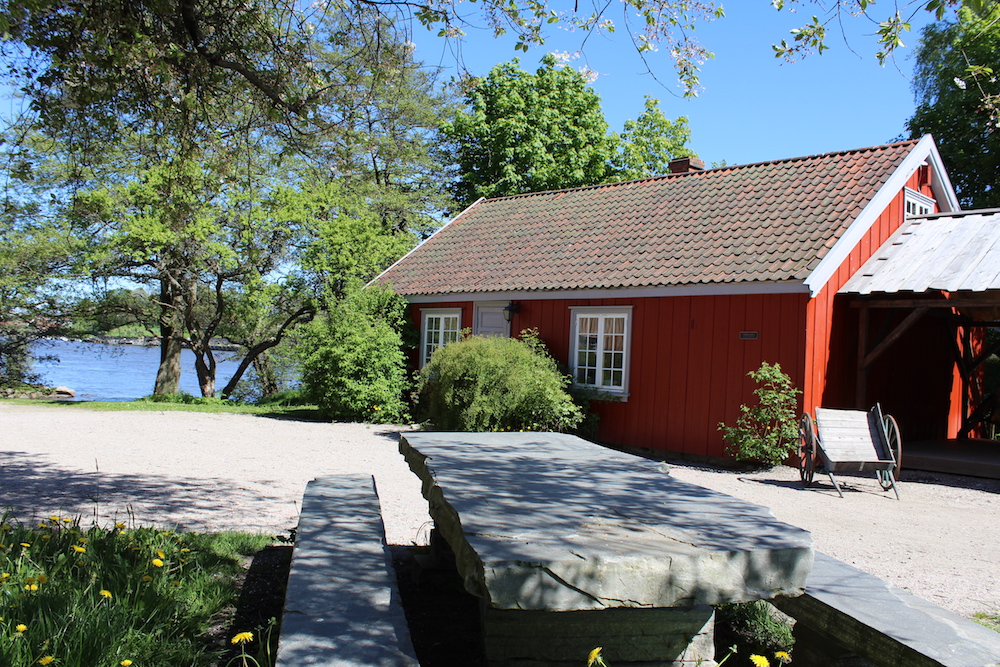
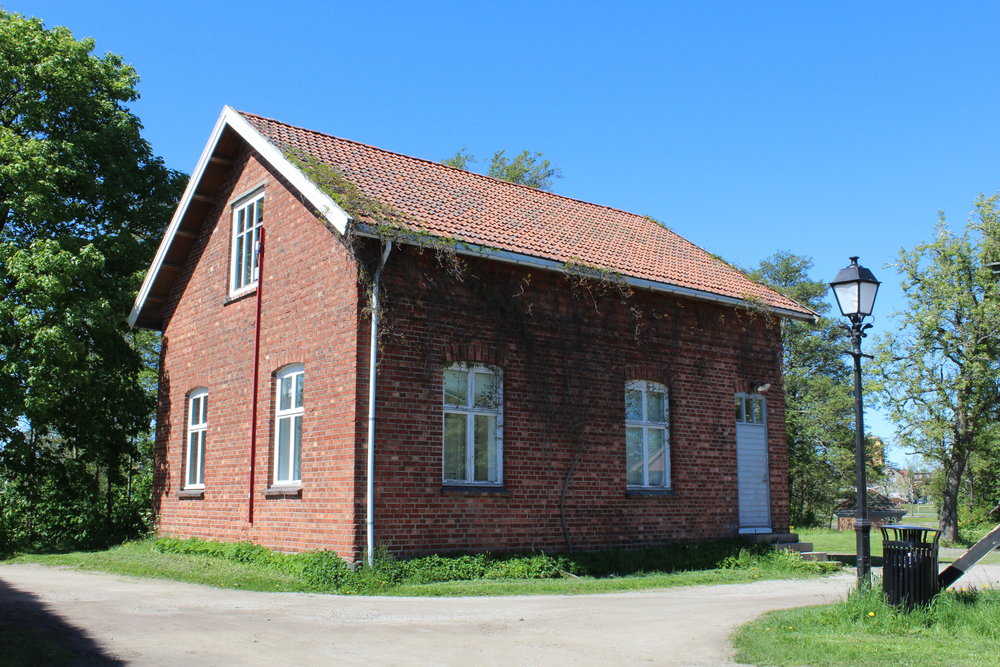
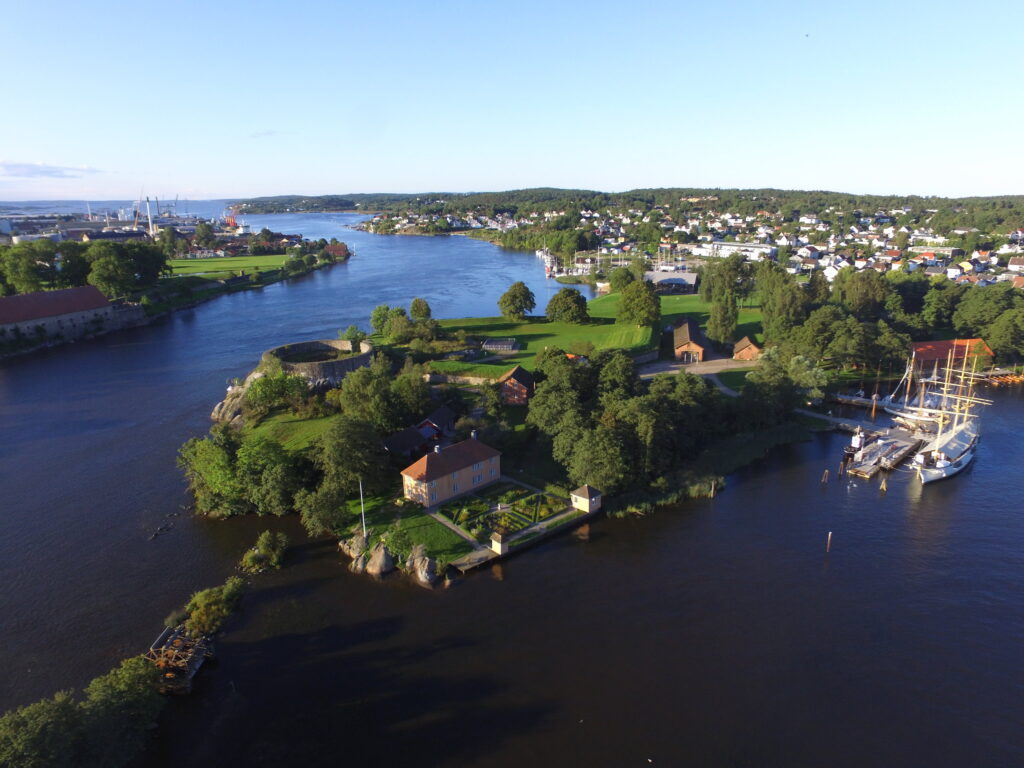
Isegran is a small, historic island located in the very heart of Fredrikstad. Surrounded by water and greenery, it has long been a hub for maritime culture, traditional craftsmanship and grounded living. The island offers a quiet yet central setting for reflection, movement and connection. Our course is based at Minemagasinet – a warm and welcoming venue made up of several charming buildings nestled in a green, car-free park on the island. It includes a large main room for shared sessions, several smaller rooms for group work and rest, and access to outdoor spaces for rhythm, meals and conversation. We also make use of other nearby facilities on Isegran, giving the course flexibility and room to breathe – with space for both whole-group gatherings and parallel activities. Minemagasinet provides an ideal setting for learning and living together. The compact layout and natural surroundings support a sense of community, simplicity and shared focus – everything you need is close, and the rhythm of the days becomes easy to follow.
The venue is easily accessible by foot and by free ferry from the city centre.
Shops, pharmacies, and amenities are within walking distance.
🛏️ Accommodation – staying on Isegran
During the course, most participants will be accommodated in one of the historic houses on Isegran. These simple but charming buildings – Kabelmagasinet, Widdingstua and Annekset – offer a rare chance to live right in the heart of the course environment.
Rooms are shared, with 2–4 beds per room, and facilities are basic but sufficient. Some rooms have shared bathrooms, and the houses retain much of their original character – wooden floors, creaking stairs and handmade details. It’s not a four-star hotel, and that’s part of the point.
What you get in return is something few places can offer:
✅ waking up surrounded by nature and sea
✅ eating together in old common rooms
✅ being part of a living learning community from morning to night
We ask everyone to come with a bit of flexibility and openness – and in return you’ll get the best view in town, and a rare kind of stillness that supports both rest and connection.
🕊️ The Cathedral of Hope
The Cathedral of Hope is a floating wooden structure anchored at Isegran – built entirely from recycled materials, through collective effort. It stands as a symbol of shared responsibility, sustainability and possibility, both physically and spiritually.
The cathedral is co-owned by a unique alliance of faith-based and humanitarian actors, including:
Dialogforum Østfold, Kirkens Bymisjon Østfold, Norges Buddhistforbund, Caritas Norge, Borg diocese and Fredrikstad Church Council.
Together, they form an open, inclusive community that works actively with what they call “diapraksis” – where people from different religions and cultures engage in practical collaboration toward common goals.
This open worldview resonates deeply with the FIRTO project and several of our international partners who are actively involved in Erasmus+ projects with Interfaith Dialogue. Both the cathedral and the course explore what it means to build connection, trust and belonging across difference – not just in theory, but in practice.
During the week, several sessions in Håpets katedral will be open to the local community, inviting residents of Fredrikstad to participate in shared experiences of rhythm, reflection and creative dialogue. These open sessions are fully optional for our course participants.
At the same time, the course will run parallel sessions in Minemagasinet and nearby rooms – giving space for focused practice, mentoring and peer-led facilitation. This balance allows us to engage with the wider world while protecting the depth of the learning process.
Håpets katedral offers a special kind of space – one that encourages stillness without silence, reverence without rigidity, and meeting without agenda. It is one of the many gifts of Isegran – and a quiet reminder of what can happen when we build something together.
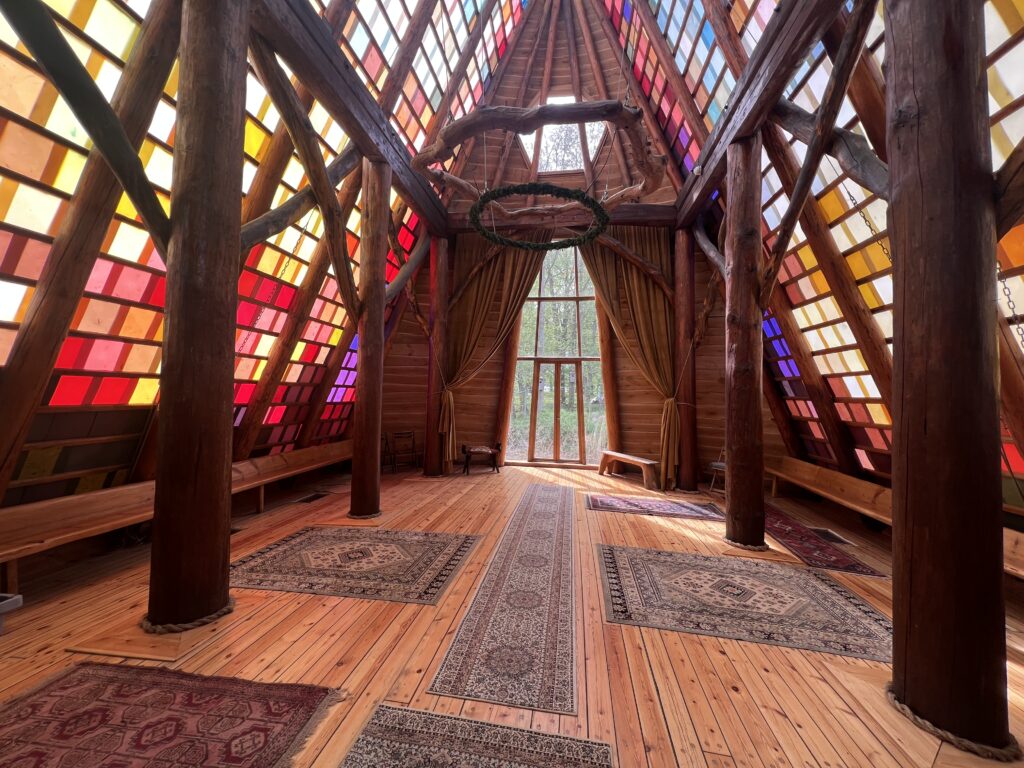

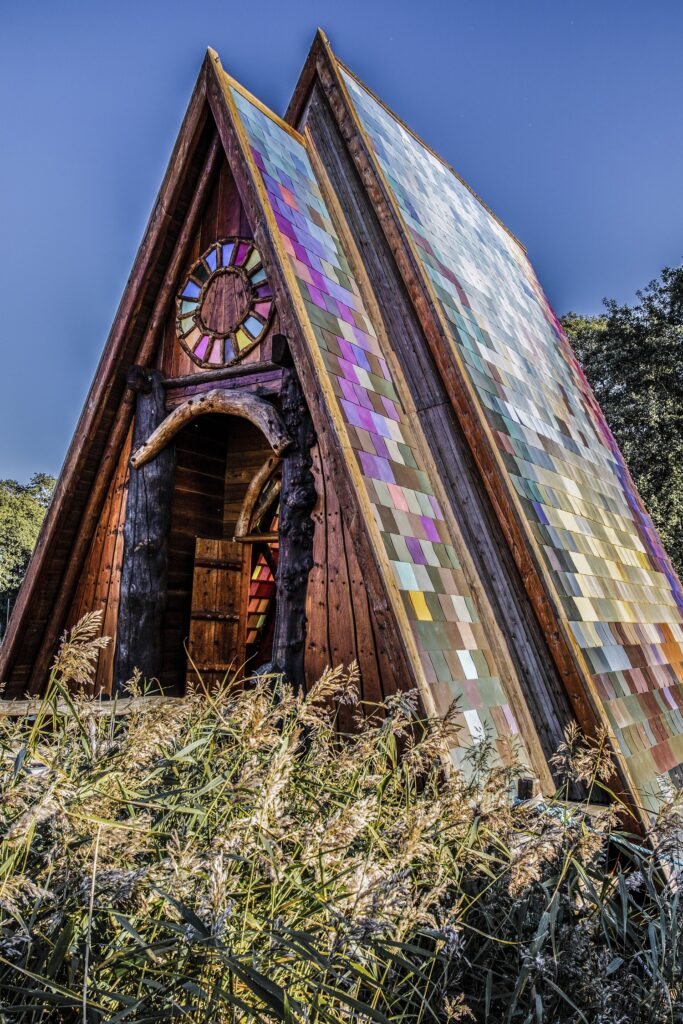
📅 Dates
28 September – 4 October 2025 (Week 40)
📍 Arrival: Sunday 28 September. Staff will be at the venue from 13:00. Soup is served from 17:00 — no other meals are served on Sunday. Welcoming drum-circle at 18:00.
📅 Monday to Friday — training program, all meals included.
📍 Departure: Saturday 4 October. Breakfast will be served in the morning. No other meals or program.
🥗 Food
All meals included for those who reside at Minemagasinet. Lunch and dinner included for those who have private accommodation.
✈️ Travel information
Fredrikstad is located on both the main railway line and the E6 highway corridor between Oslo and Gothenburg/Copenhagen. It is easily accessible by both train and long-distance bus from either direction.
Arrival city: Fredrikstad, Norway. The name of our venue is Minemagasinet. Minemagasinet is located on a small island called Isegran.
Nearest airport: Oslo Gardermoen (OSL)
Alternate airport: Torp Sandefjord (TRF) – longer travel time, but still possible.
Once you’re in Fredrikstad, getting to the venue is easy – Isegran is a small island in the middle of the city centre.
🚌 The easiest way to reach the venue is by Vy bus 6 (VY6). This line runs from Oslo all the way to Hvaler. Get off at Fredrikstad, Kommunehuset Kråkerøy. From there it is only a short walk to the venue.
From Oslo Airport (OSL) there are several good ways to connect with Vy bus 6. One option is to take a Vy train to Oslo Central Station. From there it is a short walk to Oslo Bus Terminal where Vy bus 6 departs. Another option is to take the Vy Airport Express bus directly from the airport to Mosseporten and change there to Vy bus 6. At Mosseporten it is important to ask the driver where to board Vy 6 towards Fredrikstad. There are several stops on both sides of the road and it is easy to make a mistake.
🚂 If you take a Vy train all the way from Oslo Airport to Fredrikstad, or arrive by train from the south, it is a short walk from the railway station to the city ferry. The stop closest to the venue is Smertu which is located right by Isegran.
🚌 If you arrive in Fredrikstad by long-distance coach either from the airport, or from the south, you can continue with a local bus to Kommunehuset Kråkerøy. If you are not in a hurry you can also walk to the city ferry, which is free of charge. In that case go on board at Sentrum Fergeleie.
Tickets
If you are travelling from Oslo Airport (OSL) or from Oslo city centre, tickets can be bought at vy.no, in the Vy app, or at ticket machines. Both bus and train tickets are available. We recommend buying your ticket in advance, as it is more expensive to purchase on board the train or the bus.
Please note that the Airport Express Train (Flytoget) only runs between Oslo Airport and Oslo city centre and is not included. If you choose to take the Airport Express Train, reimbursement will only cover the equivalent Vy ticket price. Tickets and information for Flytoget are available at flytoget.no.
There is no need to buy your Vy tickets between Oslo Airport and Fredrikstad, or between Oslo and Fredrikstad, weeks in advance. It is fine to purchase them when you arrive in Oslo.
Vy links: Vy bus / Vy train
For Flytoget (Airport Express Train), tickets and information are available at flytoget.no.
🧭 Getting to the venue – Isegran
with the free ferry
Isegran is a small island located right in the centre of Fredrikstad
The easiest and most scenic route is to walk to the free city ferry («Byferga»), which crosses the river several times an hour.
🗺️ Directions from Fredrikstad Bus station:
- Walk ~15 minutes to the Byferga ferry pier Sentrum Fergeleie:
📍 https://maps.app.goo.gl/S6mToFPQA3EiE3Za8 - Take the ferry back across the river and get off at Smertu:
📍 https://maps.app.goo.gl/vm3uSNqz9ziKtxEn8 - The venue and meeting point is just a short walk from the ferry landing:
📍 https://maps.app.goo.gl/UtyLxiLSuMDSwyos9
🗺️ Directions from Fredrikstad railway station:
- Walk ~15 minutes to the Byferga ferry pier Cicignon Fergeleie that take you to Gamlebyen:
📍 https://maps.app.goo.gl/8C27CqZRHPuTJ1m19 - In Gamlebyen, go of and take the similar ferry towards Gressvik back across the river and get off at Smertu:
📍 https://maps.app.goo.gl/vm3uSNqz9ziKtxEn8 - The venue and meeting point is just a short walk from the ferry landing:
📍 https://maps.app.goo.gl/UtyLxiLSuMDSwyos9
🛶 The ferry is free of charge, runs frequently, and operates throughout the day.
Costs
The participation fee for this course is €100. This covers the full program, shared accommodation, and all meals throughout the week. In addition, participants receive travel support based on distance.This highly subsidised offer is made possible through co-funding from the Erasmus+ programme. For details about travel reimbursement and support, see the section Financial Support below.
Payment
The participation fee will be deducted directly from the travel reimbursement for international participants. You do not need to make a separate payment — the amount will be adjusted before the travel support is transferred to you.
Norwegian participants will receive an invoice or may choose to pay via Vipps. The preferred method is selected during registration.
What the Participation Fee Covers
Accommodation and food are particularly expensive in Norway, and the participation fee helps us bridge the gap between the funding we receive and the actual costs of hosting the course. Your contribution ensures that all participants can enjoy shared meals and comfortable lodging throughout the week.
The fee also covers the cost of providing high-quality instruments and materials for everyone, so that each participant has what they need to take part fully, regardless of what they bring with them.
«If the Fee Is a Barrier»
We know that even €100 can be too much. Money shouldn’t decide whether you get to be part of this experience, so we’ve made room. Some spots are available for €50, and a few are completely free for those who need it most.
If this makes the difference for you, just let us know in the final comment section of the registration form. No need to explain or justify — we trust you. What matters most is that you want to be here. We’ll do our best to make that possible.
Financial Support
As a participant in FIRTO, you are entitled to travel reimbursement through Erasmus+. The amount you receive depends on the distance between your home organisation and the course venue in Fredrikstad, Norway.
Below are the standard reimbursement rates for each country participating in this training:
- 🇮🇹 Italy – €309
- 🇬🇷 Greece – €395
- 🇪🇸 Spain – €395
- 🇭🇺 Hungary – €309
- 🇸🇪 Sweden – €211
- 🇳🇴 Norway – €28
- 🇩🇰 Denmark – €211
- 🇪🇪 Estonia – €309
- 🇵🇹 Portugal – €395
These amounts are refunded after participation, and you will need to provide receipts and boarding passes.
We are committed to accessibility and inclusion. If you have special needs related to travel or financial circumstances, please contact us – individual arrangements can be made.
We strongly encourage green travel whenever possible. Choosing environmentally friendly transport may increase your reimbursement amount.
What to bring
🎒 Here’s a list of practical items we recommend bringing to the course. Some are essential, others are simply good to have:
- Comfortable clothes for movement and rhythm sessions
- Expect typical Norwegian autumn weather — bring warm clothes and waterproof outerwear.
- Indoor shoes or thick socks (some rooms have wooden floors)
- Towel (bed linen is provided)
- Toiletries (toothbrush, soap, shampoo, etc.)
- Earplugs (some rooms are shared – and old buildings creak)
- Water bottle
- Notebook and pen
- Personal medications
- Travel insurance (required)
- European Health Insurance Card (EHIC) – if you are from an EU/EEA country
- Chargers and adapters (Norwegian plugs are EU standard)
- Musical instruments (optional – we provide drums)
- A small flashlight or headlamp
- A warm scarf or blanket for outdoor evening sessions
- Snacks or comfort items from home
Insurance and EHIC
🛡️ All participants are required to have valid travel insurance and a European Health Insurance Card (EHIC). In the registration form, you’ll be asked to confirm whether you already have these, are in the process of getting them, or need help to arrange them.
Accessibility and Individual Needs
♿ We want everyone to be able to take part fully. If you have any physical, sensory or neurodivergent needs — for example sensory sensitivities, communication preferences or the need for more structure — you can share this in the registration form. We’ll do our best to make sure your needs are met so that you can participate on equal terms.
💬 Language and communication
The course is held in English, but body language, music and rhythm make the real connection. You don’t have to be fluent – just open.
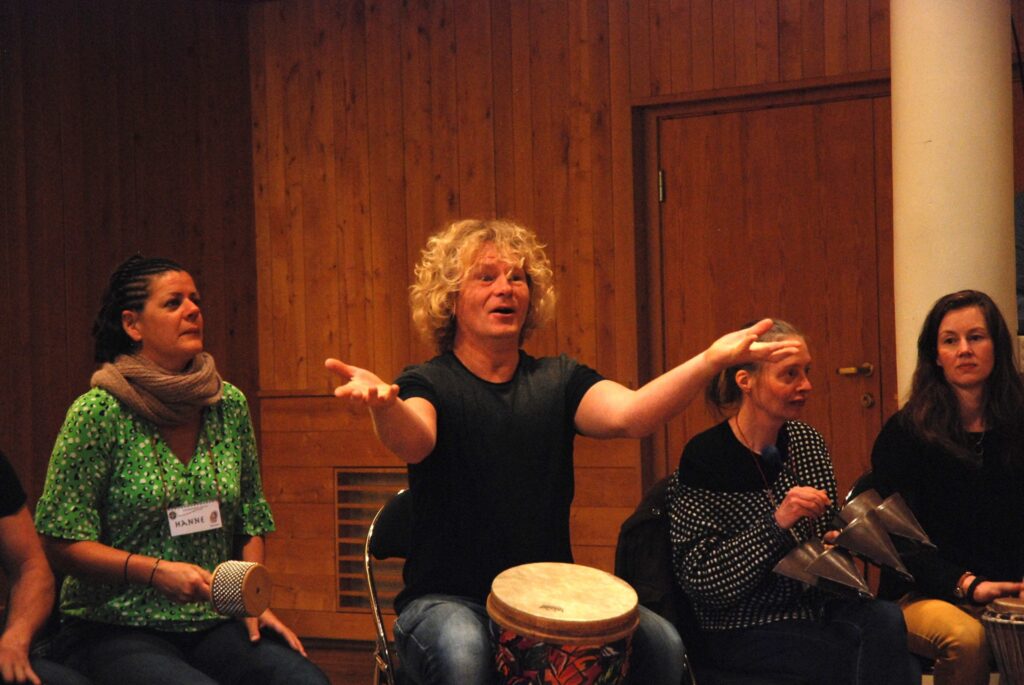
🤝 Hosted by Klart Det
Klart Det is a Norwegian non-profit dedicated to inclusive, experience-based learning in youth work. We use rhythm, sailing and other activity-based methods to strengthen participation and belonging among young people, and support youth workers in doing the same.
FIRTO is part of our long-term commitment to high-quality non-formal education in Europe, through Erasmus+ and beyond. The course is hosted in Norway and supported by nine partner organisations from across Europe:
- Circolo Amarti APS (Italy)
- I.D.E.A. (Greece)
- SAL FUERA ELX (Spain)
- Puentes Hungary (Hungary)
- Positive Footsteps (Sweden)
- MindClub (Denmark)
- Youth Senate Tallinn (Estonia)
- Santa Casa da Misericórdia de Lisboa (Portugal)
- Stiftelsen Dissimilis (Norway)
Thanks to Erasmus+ support, we are able to offer places for the following number of participants from each country:
- Norway – 10
- Italy – 2
- Greece – 2
- Spain – 5
- Hungary – 3
- Sweden – 2
- Denmark – 3
- Estonia – 3
- Portugal – 2
Participants need to be affiliated with one of the listed organisations. If you are not yet a member, it’s easy to join. Let us know in the registration form, and we’ll help you connect.
🔄 Learning resources
All participants will receive a work bok. All participants will also receive a copy of chapter 4 of the book: «Drum Circle Facilitation: Building Community Through Rhythm«. The whole book can be bought from the link below.
This book is covering everything in the drum circle facilitation part of the training:
https://a.co/d/8g9npHI
Video from one of Mikael Khei’s previous trainings in Norway:
Video from a drum circle facilitation training:
Long and detailed video about how to facilitate a drum circle. Please watch it before the training, this will speed up your learning process: